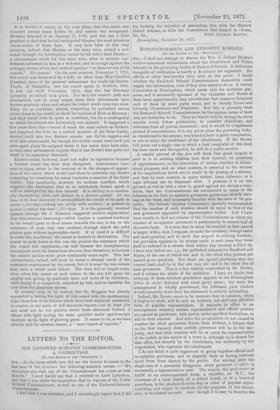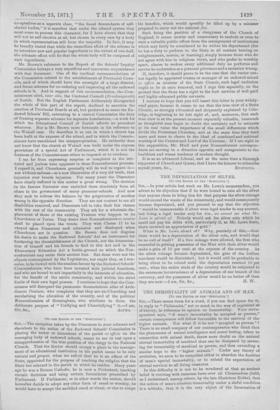ONCONFORMISTS AND ENDOWED SCHOOLS.
[TO TIIR EDITOR OF THE " SPECTATOR."]
SIR,—I shall not attempt to discuss the Rev. J. Jenkyn Brown's curious numerical calculations about the Churchmen and Tories who are on the governing bodies of Endowed Schools. A statement incapable of verification is hardly a fit subject for argument. No official or other trustworthy data exist on this point. I doubt whether the Endowed Schools' Commissioners themselves could supply the information, even if they were asked to do so. A central Committee at Birmingham, which exists only for sectarian pur- poses, and is necessarily ignorant of the character and fitness of these local appointments, may nevertheless find means to designate each of thorn by some party name, and to classify Tories and Liberals, Churchmen and Dissenters. But this is precisely what the Endowed Schools' Commissioners, by the express terms of their Act, are forbidden to do. They are bound indeed, during the three months which follow publication, to consider objections and criticisms from all parties interested ; and it would be a legitimate ground of remonstrance, if in any given place the governing body, as constituted in the scheme, was found to,have a party complexion, or not to enjoy the confidence of the inhabitants. If Mr. Brown will point out a single case in which a local complaint of this kind has been made and disregarded, he will do a public service.
A careful perusal of the Act will show that great respect is paid in it to existing trustees, that their consent, on questions of apportionment, on the conversion of useless charities to educa- tional purposes, and on other matters, is essential to the 8110Oess of the negotiations which are to result in the passing of a scheme, and that by such consent, in many critical cases, reference to a legal tribunal can be dispensed with. I presume it is on this ground, as well as with a view to guard against too abrupt a tran- sition, that the Commissioners are accustomed to name in the schemes as the first co-optative governors gentlemen already serv- ing on the trust, and necessarily familiar with the state of its pro- perty. The Schools' Inquiry Commission specially recommended that the number of such trustees should be equal to that of the new governors appointed by representative bodies. And I have been unable to find any scheme of the Commissioners in which the number of co-optative governors is permanently to exceed half of the entire body. It is true that in many the number at first named is larger, with a view, I suppose, to make the necessary change easier and more gradual, and to show due respect to existing trustees but provision appears to be always made in such cases that these shall be reduced to a certain limit before any vacancy is filled up. I have now before me, e.g., the published schemes for Bradford and Ripon, in the one of which ten and in the other nine persons are named as co-optatives. But there are special provisions that the normal limit shall be in the one case six and in the other five of such governors. This is a fact entirely overlooked by Mr. Brown, and it vitiates the whole of his statistics. I have no doubt that everyone of these nineteen gentlemen appears in the Birmingham lettres de cachet ticketed with some party name but since the arrangement is wholly provisional, the inference your readers would naturally draw from his statement is entirely misleading.
Indeed, Mr. Brown seems to be unaware that co-optation, when it begins to work, will be only an indirect, but still very effective form of popular representation. It amounts in effect to an arrangement whereby certain representative and official persons are named as governors, with power, under specified limitations, to add to their number. And since the co-optatives do not exceed in number the other governors drawn from without, it follows that on the first vacancy these outside governors will be in the ma- jority, and that their nominee will be as much the representative of the public as the mayor of a town is, although he is chosen for that office, not directly by the inhabitants, but indirectly by the corporation, who represent the inhabitants.
I do not think it quite ingenuous to group together official and co-optative governors, and to describe them as having interests apart from those elected by the public. For setting aside the single case of a parochial clergyman, every governor ex officio is necessarily a representative man. The mayor, the port-reeve or bailiff in an unincorporated town, a recorder, an M.P., the chairman of a local board, of a school board, or of a board of guardians, is the product in some way or other of popular repre- sentation, and ought in candour, for the purposes of this discus- sion, to be classed as such. And though it is easy to describe the
co-optatives as a separate class, "the lineal descendants of self- elected bodies," it is manifest that under the altered system they must cease to possess this character, for I have shown that they will not be self-elective at all, but chosen in every case by a body in which representatives will form the majority. In fact, it may -be broadly stated that while the immediate effect of the scheme is to introduce new and popular ingredients to the extent of one-half, the ultimate effect will be that the whole body will be composed of such ingredients.
Mr. Brown's reference to the Report of the Schools' Inquiry Commission betrays a very superficial and inaccurate acquaintance with that document. One of the cardinal recommendations of the Commission related to the establishment of Provincial Coun- ;oils, each of which should have the oversight of a large district, -and frame schemes for co-ordering and improving all the endowed echools in it. And in support of this recommendatiou, the Com- missioners cited, inter alia, the Cantonal Council (Erziehungsrath) of Zurich. But the English Parliament deliberately disregarded the whole of this part of the report, declined to sanction the 'creation of Provincial Boards at all, but preferred to enact the En- dowed Schools' Bill, entrusting to a central Commission the duty .of framing separate schemes for separate foundations, —a work for which the Educational Council of Zurich affords no precedent whatever. Nor is Mr. Brown more fortunate in his reference to the Walsall case. He describes it as one in which a church has been built at the expense of the school, and in which the Commis- eioners have sanctioned the misappropriation. He evidently does not know that the church at Walsall was built under the express provisions of a special Act of Parliament, which it is not the 'business of the Commissioners either to impeach or to condone.
I am far from expressing surprise or complaint at the irri- tated and jealous tone apparent in these Nonconformist protests. I regard it, and Churchmen generally will do well to regard it— not without sadness—as a new illustration of a very old truth, that 'injustice ever breeds injustice. For many years the Dissenters have clearly suffered in this matter a great wrong. The decision fin the famous Ilmiuster case excluded them absolutely from all share in the government of many grammar-schools. And now 'they seek to redress the balance by the perpetration of another wrong in the opposite direction. They are not content to see all disabilities removed, and Dissenters left to take their fair chance with the rest of the community. They ask for a wholesale dis- placement of those of the existing Trustees who happen to be Churchmen or Tories. They desire that Nonconformists co ;zombie shall be placed upon the trusts. They wish Clause 17 to be obeyed Alien Dissenters seek admission and disobeyed when 'Churchmen are in question. Mr. Brown does not disguise this deeire to make the Endowed Schools' Act an instrument for furthering the disestabliehment of the Church, nor the determina- tion of himself and his friends to find in this Act and in the Elementary Education Act a battle-ground on which the Non- 'conformists may smite their ancient foes. But these were not the objects contemplated by the Legislature, nor ought they, as I con-
■ eeive, to be viewed with the smallest favour by the Endowed Schools' Commissioners, who have been invested with judicial functions, and who are bound to act impartially in the interests of education, for the benefit of the entire community, and within the strict 'limits of their own legal powers. I continue to hope that the Com- -mission will disregard the passionate denunciations alike of Arch- deacon Denison, who complains that they are un-Churching and secularizing the education of the country, and of the political Nonconformists of Birmingham, who attribute to them the deliberate purpose of " Torifying and Churchifying " it.—I am,



































 Previous page
Previous page